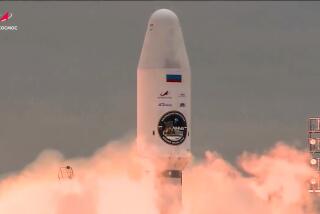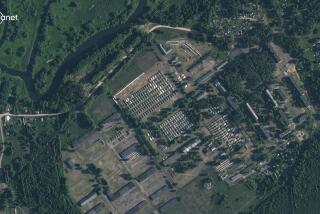TECHNOLOGY : Russia Space Program Hoping to Regain Its Old ‘Canaveral’
- Share via
MOSCOW — Wouldn’t it be a pity if Cape Canaveral suddenly belonged to another country?
That is just the sort of fix that Russia’s space sector has found itself in since the Soviet Union’s collapse in late 1991. When the former republic of Kazakhstan gained independence, it proceeded to announce that Baikonur, the main Soviet launch center that happened to be situated on its windy steppes, had become Kazakh property.
Russia inherited the Soviet Union’s ambitions in space, but not its main launch pads.
Now, after two years of negotiating with the Kazakhs, Russia hopes that President Boris N. Yeltsin will be able to sign a 30-year lease on Baikonur when he holds a meeting Monday with his Kazakh counterpart, Nursultan Nazarbayev.
If the deal falls through, however, as it has many times before, this time Russia is ready with an alternative.
Earlier this month, the commander of Russia’s military space force announced that Moscow plans to build a major new space center in the country’s Far East, on the site of a strategic missile base north of Blagoveshchensk. The spot is called Svobodny, meaning Free.
The plan may be only a bluff, or a wildcat initiative by military officials fed up with the slow pace of negotiations and Kazakh demands that Russia pay billions of dollars in rent on Baikonur.
But it sounded convincing. Col. Gen. Vladimir Ivanov told the Itar-Tass news agency that the Svobodny base will be ready by the year 2000. Then he went even further and said the first launches could begin by 1996. “This is not a retreat--on the contrary, it’s an active attack,” Ivanov said.
Russia already has another major space center, the Plesetsk Cosmodrome in the Far North. But space scientists say it is not suited for manned flights or for launching big loads into high orbits.
Svobodny reportedly offers launch sites meant for the heaviest of intercontinental missiles, as well as a ready-made road system and even a military staff that had been wondering what to do with itself now that the missiles it manned are hitting the scrapheap under Russian-American arms cuts.
Some civilian space experts do not appear to share all the military’s enthusiasm for Svobodny, however. They note that the site’s remoteness will make links with suppliers and scientific centers difficult and will add to operating costs. They also doubt that it can get up to speed so fast.
“Whoever says it will be ready in two or three years is either bluffing or doesn’t understand,” said Boris Aleskin, head of the department at the Russian Space Agency that oversees liaison with other former republics.
On the other hand, enthusiastic local officials say, Svobodny’s location near the Chinese border puts it in a good position to break into the space services market for the dynamic economies of Southeast Asia.
The greatest obstacle to moving Russia’s space center to Svobodny may be the price tag. “You need the manpower, the production and the money to invest in it,” Aleskin said.
But military officials are claiming that it will cost little to convert Svobodny--perhaps 30% of what it would cost to build a whole new site.
Meanwhile, Baikonur is plagued with problems. It was hit by a fire this month, apparently caused by a heating-system malfunction. Baikonur’s launch abilities were not affected, but scientists took the fire as a sign that the complex is deteriorating because it does not really belong to anyone.
U.S. Defense Secretary William J. Perry visited Baikonur last week and commented that it is far too big and expensive to run for Russia’s needs.
But it is still painful to Russian pride to contemplate letting Baikonur go, even if it will be replaced in the Far East.
More to Read
Sign up for Essential California
The most important California stories and recommendations in your inbox every morning.
You may occasionally receive promotional content from the Los Angeles Times.













